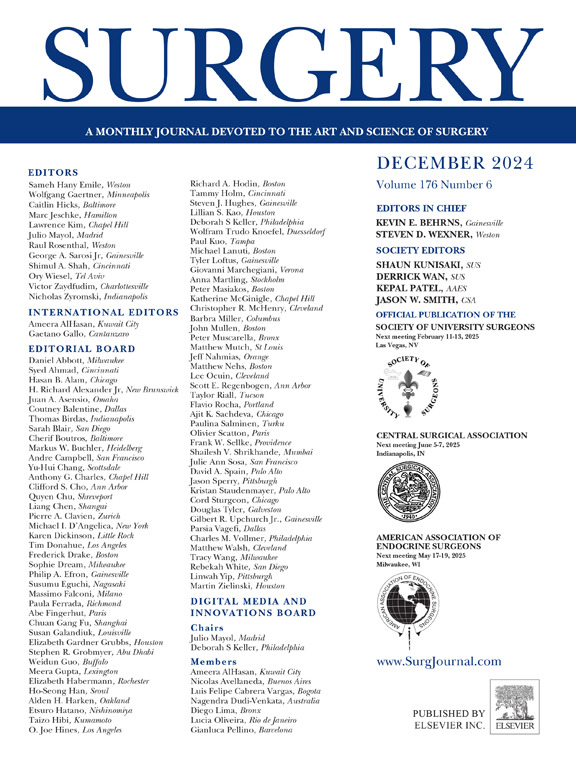Surgery or chemotherapy first? Unveiling the best approach for colorectal cancer with resectable liver metastasis
IF 3.2
2区 医学
Q1 SURGERY
引用次数: 0
Abstract
Background
Although neoadjuvant chemotherapy is foundational in treating stage IV colorectal cancer, its effectiveness for patients with resectable colorectal cancer liver metastasis is still under debate. This study evaluates the oncologic outcomes of operation-first compared with chemotherapy-first strategies in patients with initially resectable synchronous colorectal cancer liver metastasis, including the effects of targeted therapy and the survival outcomes after recurrence based on treatment strategy.
Methods
We conducted a retrospective analysis of 336 patients with resectable synchronous colorectal cancer liver metastasis who underwent complete radical resection and perioperative chemotherapy between 2007 and 2022. Patients were divided into operation-first (n = 244) and chemotherapy-first (n = 92) groups. The primary end points were disease-free survival and overall survival. We also explored the impact of targeted therapy and outcomes after recurrence.
Results
The operation-first group achieved significantly better disease-free survival and overall survival than the chemotherapy-first group. Targeted therapy was linked with lower disease-free survival and progression-free survival. Patients experiencing oligorecurrence who received local therapy had greater overall survival than those who underwent chemotherapy alone or those with polyrecurrence treated with local therapy plus chemotherapy or chemotherapy alone.
Conclusion
The operation-first strategy led to improved disease-free and overall survival in comparison with neoadjuvant chemotherapy for patients with resectable synchronous colorectal cancer liver metastasis. Local treatment of oligorecurrence improved oncologic outcomes, whereas perioperative targeted therapies were associated with poorer survival outcomes. These findings indicate the potential advantages of an operation-first approach; however, prospective randomized trials are necessary to verify these findings and to refine patient selection criteria.

先做手术还是化疗?揭示结直肠癌伴可切除肝转移的最佳治疗方法
虽然新辅助化疗是治疗IV期结直肠癌的基础,但其对可切除结直肠癌肝转移患者的有效性仍存在争议。本研究评估了初始可切除的结直肠癌同步肝转移患者手术优先与化疗优先的肿瘤预后,包括靶向治疗的效果以及基于治疗策略的复发后生存结果。方法回顾性分析2007年至2022年间336例可切除的结直肠癌同步肝转移患者行完全根治术和围手术期化疗。将患者分为先手术组(244例)和化疗组(92例)。主要终点为无病生存期和总生存期。我们还探讨了靶向治疗和复发后预后的影响。结果手术先治组患者的无病生存期和总生存期明显优于化疗先治组。靶向治疗与较低的无病生存期和无进展生存期相关。接受局部治疗的少复发患者的总生存率高于单独化疗或局部治疗加化疗或单独化疗的多复发患者。结论与新辅助化疗相比,手术优先策略可提高可切除的结直肠癌同步肝转移患者的无病生存率和总生存率。局部治疗少复发可改善肿瘤预后,而围手术期靶向治疗与较差的生存预后相关。这些发现表明手术优先的潜在优势;然而,需要前瞻性随机试验来验证这些发现并完善患者选择标准。
本文章由计算机程序翻译,如有差异,请以英文原文为准。
求助全文
约1分钟内获得全文
求助全文
来源期刊

Surgery
医学-外科
CiteScore
5.40
自引率
5.30%
发文量
687
审稿时长
64 days
期刊介绍:
For 66 years, Surgery has published practical, authoritative information about procedures, clinical advances, and major trends shaping general surgery. Each issue features original scientific contributions and clinical reports. Peer-reviewed articles cover topics in oncology, trauma, gastrointestinal, vascular, and transplantation surgery. The journal also publishes papers from the meetings of its sponsoring societies, the Society of University Surgeons, the Central Surgical Association, and the American Association of Endocrine Surgeons.
 求助内容:
求助内容: 应助结果提醒方式:
应助结果提醒方式:


